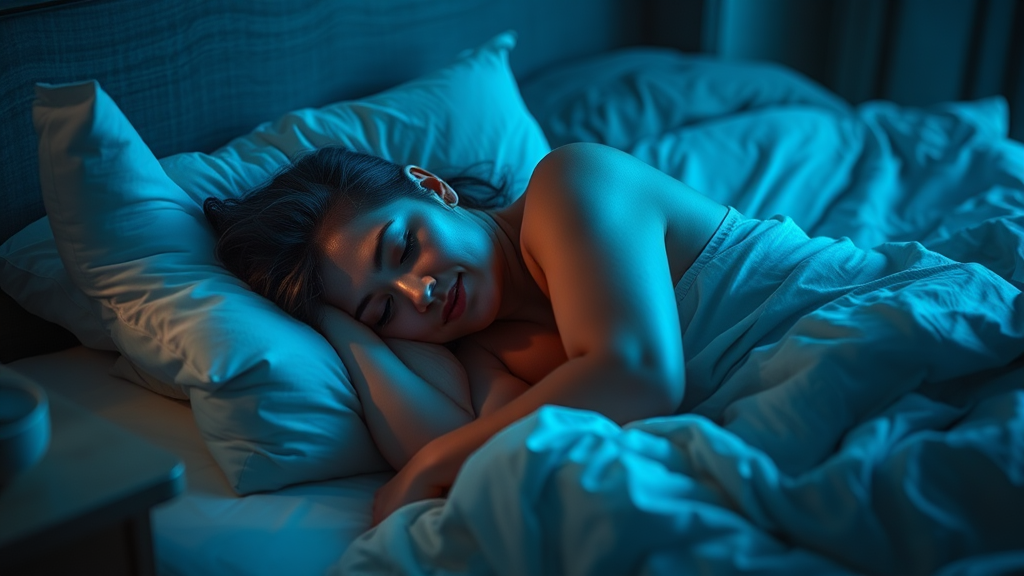Insomnia in Women: The Impact of Hormonal Changes During Menopause
Insomnia affects many women, particularly during the transitional phase of menopause. Hormonal fluctuations play a critical role in shaping sleep patterns, impacting both quality and duration of sleep. Understanding how these changes occur and how they affect mental and physical well-being is vital for anyone navigating this life phase.
During menopause, estrogen and progesterone levels drop significantly. These hormones are crucial for sleep regulation, and their decline can lead to insomnia. Women may experience difficulty falling asleep, staying asleep, or waking up too early. Here are some ways menopause-related hormonal changes can trigger sleep disturbances:
- Hot Flashes: Sudden feelings of heat can lead to restlessness at night, making it hard to maintain sleep.
- Anxiety and Mood Changes: Hormonal shifts can heighten feelings of anxiety or depression, disrupting sleep cycles.
- Night Sweats: Increased sweating at night can disturb sleep, often requiring changing bedclothes or bedding.
Let’s take a closer look at how these factors intertwine:
Hormonal Changes and Sleep Patterns
As women approach menopause, their bodies undergo many changes. It’s helpful to recognize a few core areas that can directly affect sleep.
Estrogen’s Role
Estrogen is known to have a significant influence on sleep quality. It helps regulate the sleep-wake cycle and enhances restorative sleep. When estrogen levels decline, many women report increased sleep disruptions. Research indicates that lower estrogen levels are correlated with the following sleep issues:
- Difficulty falling asleep
- Frequent awakenings during the night
- Feeling unrested upon waking
Progesterone and Relaxation
Progesterone often helps in promoting sleep and relaxation. As its levels fall during menopause, women might notice a decline in their ability to achieve the deep sleep necessary for feeling refreshed. This leads to a cycle of fatigue that can affect daily life.
Additional Factors Contributing to Insomnia
Besides hormonal changes, several other menopausal symptoms might contribute to insomnia:
- Physical Discomfort: Some women may experience joint pain or other physical symptoms that make sleeping difficult.
- Cognitive Changes: Memory lapses and concentration issues may surface, adding to feelings of stress and sleep disruption.
- Chronic Health Issues: Existing health conditions may be exacerbated during menopause, worsening sleep quality.
Impact on Daily Life
Dealing with insomnia during menopause can affect every aspect of a woman’s life:
- Work Performance: Fatigue can hinder concentration, impacting productivity.
- Relationship Strain: Mood swings and irritability can strain personal relationships.
- Health Complications: Chronic insomnia can lead to serious health issues, such as increased risk for heart disease and diabetes.
Managing Insomnia During Menopause
If you’re experiencing insomnia due to hormonal changes, there are several strategies to help manage your sleep:
- Healthy Sleep Environment: Keep your bedroom cool and dark. Consider using blackout curtains and a white noise machine.
- Regular Exercise: Engaging in physical activities during the day can promote better sleep at night.
- Mindfulness and Relaxation Techniques: Practices such as meditation, deep-breathing exercises, and yoga can help reduce stress.
- Nutritional Adjustments: Avoiding caffeine and large meals close to bedtime can facilitate better sleep.
Consider consulting a healthcare provider for tailored advice and potential treatment options. Hormone therapy may be effective for some, while others may find relief through lifestyle changes or herbal supplements.
Understanding insomnia in women during menopause can empower you to take control of your sleep health. By recognizing the factors at play and practicing effective management strategies, you can work toward restoring restful sleep and enhancing your overall quality of life.
Understanding Sleep Patterns: How Menopause Alters Women’s Rest
Menopause is a natural stage in a woman’s life, marking the end of her menstrual cycles. This period often comes with various symptoms, including sleep disturbances that can profoundly affect overall health. Understanding how menopause alters women’s rest is crucial, as many women experience insomnia or disrupted sleep patterns during this time.
Changes in hormone levels, particularly estrogen and progesterone, play a significant role in sleep quality. These hormonal shifts can lead to a variety of symptoms that impact a woman’s ability to fall asleep and stay asleep. Below are some key points explaining how these changes influence sleep:
- Reduced Estrogen: Estrogen is known to help regulate sleep patterns. As levels decrease during menopause, women may find it harder to fall asleep or maintain uninterrupted sleep.
- Fluctuating Progesterone: Progesterone generally promotes sleep. However, as progesterone levels fluctuate, this can lead to increased wakefulness during the night.
- Night Sweats and Hot Flashes: One of the most common symptoms of menopause, hot flashes can disrupt sleep. Waking up drenched in sweat can make it difficult to return to sleep.
- Increased Anxiety and Mood Changes: Hormonal changes can also lead to mood swings and increased anxiety, making it challenging to relax and fall asleep.
Many women struggling with insomnia during menopause may experience the following sleep issues:
| Sleep Issue | Description |
|---|---|
| Difficulty Falling Asleep | It may take longer to wind down and fall asleep due to hormonal changes and underlying stress. |
| Frequent Awakenings | A woman may wake up several times during the night, making it hard to reach deep sleep stages. |
| Restless Sleep | Sleep may be less restorative due to interruptions or the inability to find a comfortable sleeping position. |
| Early Morning Awakening | Waking up too soon and feeling unable to return to sleep can be frustrating. |
To address these sleep disturbances, several effective strategies can be implemented:
- Regular Sleep Schedule: Going to bed and waking up at the same time each day helps regulate your body’s internal clock.
- Healthy Sleep Environment: Create a comfortable and dark sleep space. Consider using blackout curtains and eliminating noise to improve sleep quality.
- Relaxation Techniques: Engaging in activities like meditation, deep breathing exercises, or gentle yoga before bed can promote relaxation and ease anxiety.
- Avoid Stimulants: Limit caffeine and nicotine intake, especially later in the day, to enhance sleep quality.
- Stay Active: Regular physical activity can promote better sleep. Aim for at least 30 minutes of moderate exercise most days.
Nutrition also plays a crucial role in managing insomnia. Certain foods can help promote better sleep. Consider incorporating the following into your diet:
| Food | Benefit |
|---|---|
| Almonds | Rich in magnesium, which promotes better sleep quality. |
| Cherry Juice | Contains melatonin, which regulates the sleep-wake cycle. |
| Fatty Fish | High in omega-3 fatty acids and vitamin D, which are associated with better sleep. |
| Kiwi | May improve sleep onset, duration, and efficiency due to its serotonin content. |
While balancing hormones alone may not entirely resolve insomnia during menopause, adopting a holistic approach addressing both lifestyle and dietary choices can significantly improve sleep. If sleep issues persist, consulting healthcare providers for further recommendations is essential. Proper support can help navigate this transition and enhance sleep quality, allowing women to feel more rested and rejuvenated.
Strategies for Managing Sleep Disruptions During Menopause
Experiencing sleep disturbances during menopause is common among women. Hormonal fluctuations can affect your ability to fall asleep and stay asleep. If you’re navigating these changes, implementing effective strategies can help manage your sleep disruptions. Here are some advanced techniques that may enhance your sleep quality during this transitional period.
Understanding Sleep Disruptions
Before delving into solutions, it’s vital to understand why menopause affects sleep. As estrogen and progesterone levels fluctuate, you may experience symptoms like hot flashes and night sweats, which can disrupt your sleep. Stress and anxiety related to these changes can also contribute to sleep disturbances. With this understanding, you can better address the issues.
Establishing a Consistent Sleep Routine
Creating a sleep schedule can significantly improve your sleep quality. Here are some steps to follow:
- Go to bed and wake up at the same time every day: This helps regulate your body’s internal clock.
- Create a bedtime ritual: Engage in calming activities like reading or gentle yoga.
- Limit daytime naps: If needed, keep naps short and avoid late-afternoon sleep to ensure nighttime rest.
Creating a Sleep-Friendly Environment
Your sleep space can heavily influence the quality of your rest. Make these adjustments to ensure your room promotes better sleep:
- Keep your bedroom dark: Use blackout curtains to block outside light.
- Control the temperature: Maintaining a cool room can alleviate hot flashes during the night.
- Invest in a comfortable mattress: A supportive mattress can help reduce discomfort during sleep.
Managing Hot Flashes and Night Sweats
Hot flashes and night sweats are notorious for disrupting sleep. Try these methods to minimize their impact:
- Layer your bedding: Use light layers that can be easily adjusted throughout the night.
- Stay hydrated: Drink water throughout the day to help regulate your body temperature.
- Avoid triggers: Identify foods or beverages that may trigger hot flashes, like spicy meals or caffeine.
Relaxation Techniques
Relaxation practices can alleviate stress and prepare your body for sleep. Consider adding these techniques to your nightly routine:
- Deep breathing exercises: Focus on your breath to calm your mind and body.
- Meditation: Guided meditation can help reduce anxiety and promote tranquility.
- Progressive muscle relaxation: This technique involves tensing and relaxing muscle groups to release tension.
Maintaining a Healthy Lifestyle
Your overall health directly impacts your sleep. Incorporate the following lifestyle changes:
- Regular physical activity: Aim for 30 minutes of exercise most days, but avoid vigorous workouts close to bedtime.
- Balanced diet: Eating a variety of whole foods can stabilize your energy levels and mood.
- Limit stimulants: Reduce caffeine and avoid alcohol, especially in the hours leading up to bedtime.
Considering Herbal Remedies and Supplements
Some women find relief from sleep disturbances through herbal supplements. Consult your healthcare provider before trying:
- Melatonin: This hormone may help regulate sleep cycles.
- Valerian root: Known for its sedative properties, it might aid sleep.
- Chamomile tea: A calming beverage that can promote relaxation before bed.
Seeking Professional Help
If sleep problems persist, consider reaching out to a healthcare professional. They may recommend:
- Hormone Replacement Therapy (HRT): This treatment can help balance hormone levels and alleviate symptoms.
- Cognitive Behavioral Therapy for Insomnia (CBT-I): A structured program to address thinking patterns that disrupt sleep.
Managing sleep disruptions during menopause is achievable with the right strategies. By creating a calming environment, establishing routines, and adopting healthy habits, you can improve your sleep quality and overall well-being. Prioritizing your sleep can make a significant difference in how you navigate this transitional phase of life.
There are also sleep consultants who can help your professionally with techniques not so commonly known to people. Check out this for more resources – Hamilton sleep consultant
The Connection Between Menopausal Symptoms and Sleep Quality
Menopause is a significant transition in a woman’s life, often marked by various physical and emotional changes. One of the most concerning issues that arise during this period is the impact on sleep quality. Many women find that they experience insomnia in conjunction with hormonal changes. Understanding this connection can help in managing symptoms more effectively.
Hormonal Fluctuations and Their Impact on Sleep
During menopause, women experience a decrease in estrogen and progesterone levels. These hormones play a crucial role in regulating sleep patterns.
- Estrogen: This hormone influences sleep by aiding in the regulation of body temperature and mood. Lower levels can lead to increased awakenings throughout the night.
- Progesterone: Often considered a natural sedative, diminishing levels of progesterone can make it harder for women to fall and stay asleep.
As these hormonal shifts occur, many women may start to experience other menopausal symptoms that further disrupt their sleep quality. These symptoms can include:
- Hot flashes
- Night sweats
- Anxiety or mood swings
- Increased urination at night
The Role of Hot Flashes and Night Sweats
Hot flashes and night sweats are common complaints during menopause and can severely affect sleep. These sudden feelings of warmth are often accompanied by sweating and can lead to significant discomfort.
| Symptom | Effect on Sleep |
|---|---|
| Hot Flashes | Can awaken you from sleep, causing difficulty returning to rest. |
| Night Sweats | Can soak bedding and pajamas, leading to discomfort and disrupted sleep. |
Women may find themselves tossing and turning, making it harder to achieve a restful night. Symptoms can vary in intensity and frequency, but they often create a cycle that exacerbates sleep disturbances.
Psychological Factors and Sleep Quality
In addition to physical symptoms, psychological issues associated with menopause can further compromise sleep. Anxiety and depression are common during this life stage. Stressors relevant to life changes can lead to a restless mind when attempting to sleep. Women may find themselves worrying about:
- Life transitions
- Health concerns
- Family issues
- Financial stress
Elevated anxiety levels can trigger insomnia, causing difficulty in both falling asleep and maintaining sleep throughout the night. This creates a vicious cycle, where poor sleep contributes to increased anxiety and vice versa.
Strategies for Better Sleep During Menopause
Finding ways to improve sleep quality during menopause is crucial. Here are some strategies that can help:
- Maintain a Sleep Routine: Going to bed and waking up at the same time each day helps regulate your body’s internal clock.
- Create a Comfortable Sleep Environment: Keep your bedroom cool and dark to minimize disturbances from light or heat.
- Practice Relaxation Techniques: Engage in calming activities before bed, such as reading or meditation, to wind down.
- Watch What You Eat and Drink: Avoid heavy meals, caffeine, and alcohol close to bedtime to improve sleep quality.
Consulting with a healthcare provider may also be beneficial. They can provide guidance on potential treatments, such as hormone replacement therapy or medications specifically designed to address sleep disturbances during menopause.
Tracking Your Symptoms
Keeping a sleep diary can also help you identify patterns that may affect your sleep. Logging when you sleep, how often you wake, and any accompanying symptoms can help you and your doctor better address your sleep issues.
With the right strategies and support, managing insomnia during menopause is possible. By understanding the connection between hormonal changes and sleep quality, you can take proactive steps to improve your sleep and overall well-being during this transformative stage of life.
Long-term Effects of Sleep Deprivation in Women Experiencing Menopause
Sleep deprivation can be a significant challenge for women as they transition through menopause. During this period, hormonal changes can seriously impact sleep quality and duration, leading to long-term effects that may alter overall health and wellbeing.
Menopause typically occurs between the ages of 45 and 55, but each woman’s experience with it can vary widely. As estrogen and progesterone levels fluctuate and eventually decline, various symptoms emerge, including insomnia. A study by the National Sleep Foundation highlights that women going through menopause report sleep disturbances significantly more than their male counterparts. It’s essential to understand how these changes can affect women’s long-term health.
When experiencing long-term sleep deprivation, women may face a range of adverse effects on both their physical and mental health:
- Physical Health Risks:
- Weight Gain: Disrupted sleep can affect metabolism, leading to weight gain or obesity.
- Cardiovascular Issues: Chronic sleep loss can increase the risk of heart disease and hypertension.
- Weakened Immune Function: Lack of sleep compromises the immune system, making women more susceptible to illnesses.
- Mental Health Concerns:
- Anxiety and Depression: Sleep deprivation can amplify feelings of anxiety and increase the risk of depression.
- Cognitive Decline: Long-term lack of sleep may contribute to memory issues and cognitive impairment.
One of the critical factors in managing insomnia during menopause is understanding the intricate relationship between hormones and sleep. Estrogen plays a significant role in regulating sleep, and its decline during menopause can disrupt natural sleep cycles. Furthermore, progesterone, which has sedative effects, also decreases, making it harder for women to fall and stay asleep.
Addressing sleep issues during menopause isn’t just about managing the hormone levels; lifestyle modifications can also make a significant difference. Here are some effective strategies:
- Regular Exercise: Engaging in moderate physical activity, such as walking or yoga, can help improve sleep quality.
- Healthy Diet: Nutritional choices can impact sleep. Consuming foods rich in magnesium and calcium, such as leafy greens and dairy products, may promote better sleep.
- Sleep Hygiene: Maintaining a consistent sleep schedule, creating a calm sleeping environment, and limiting screen time before bed are essential practices.
Despite these strategies, some women may still struggle with insomnia during menopause. In such cases, it may be wise to consult a healthcare provider. They might recommend therapies, lifestyle adaptations, or even medications as potential solutions. Cognitive Behavioral Therapy for Insomnia (CBT-I), a structured program that helps individuals identify and replace thoughts and behaviors that cause or worsen sleep problems, is one effective approach.
Your health during this phase of life is essential. Here are some indicators that you might need to seek professional help for your insomnia:
- If sleep disturbances persist for several weeks.
- When daytime fatigue significantly interferes with daily activities.
- If you experience severe mood changes or increased anxiety levels.
Sleep is crucial for maintaining overall health, especially during the transitional phase of menopause. Recognizing how insomnia can affect women long-term is vital for implementing effective strategies for better sleep. Prioritizing sleep hygiene, healthy lifestyle choices, and seeking professional help when needed can significantly improve quality of life. Menopause is a natural stage in life, and addressing sleep issues can help women navigate this transition with greater ease and comfort.
Conclusion
Understanding the intricate relationship between insomnia in women during menopause is vital for navigating this transition better. Hormonal changes significantly impact sleep patterns, leading to difficulties in achieving quality rest. Many women may notice disrupted sleep and heightened insomnia symptoms due to fluctuating estrogen and progesterone levels. Knowing this can help validate the experiences many face during this stage of life.
The connection between menopausal symptoms—such as hot flashes, night sweats, and anxiety—and sleep quality is profound. Each of these symptoms can independently disturb your nightly rest, resulting in a vicious cycle of insomnia. Identifying the triggers and developing tailored strategies can make a substantial difference. Simple lifestyle adjustments, such as maintaining a consistent sleep schedule, creating a relaxing bedtime routine, and employing stress-reduction techniques, can significantly improve sleep quality.
Moreover, understanding the long-term effects of sleep deprivation is crucial, especially as it can lead to further health issues. Women’s physical and mental well-being may suffer due to chronic lack of sleep, heightening the risk for conditions like obesity, depression, and cardiovascular diseases.
By recognizing the challenges posed by insomnia during menopause and taking proactive steps to manage these changes, women can regain control over their sleep patterns and overall health. Seeking support, whether it’s from healthcare providers or community resources, can be beneficial. Each woman’s journey is unique, but with the right strategies and an understanding of the underlying issues, better sleep is achievable. Your well-being during this transitional phase can greatly influence your quality of life.



